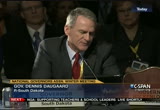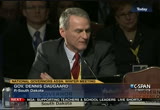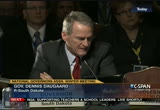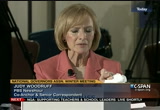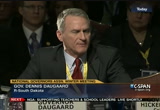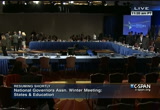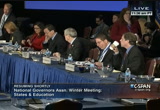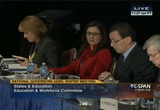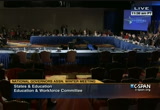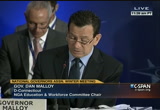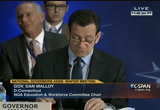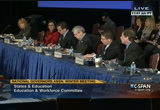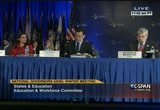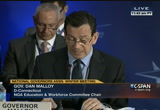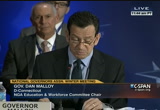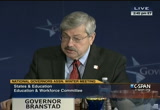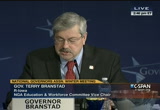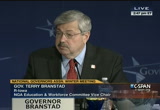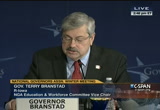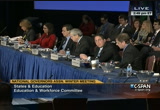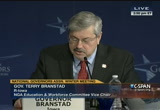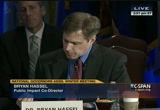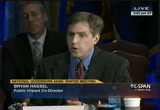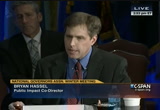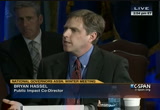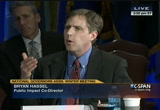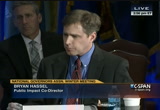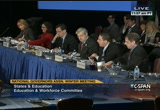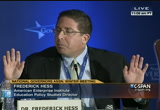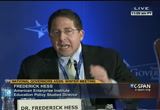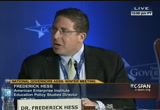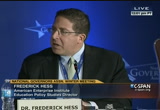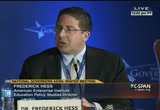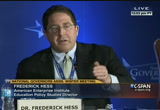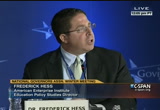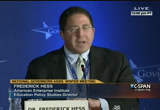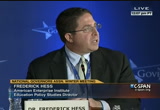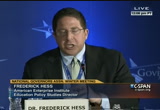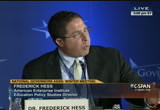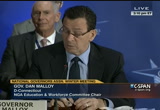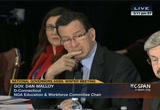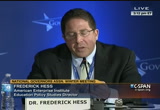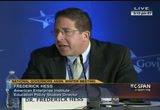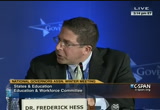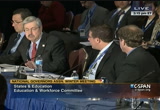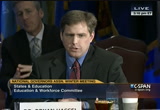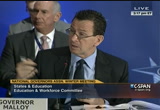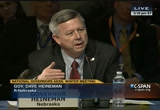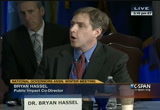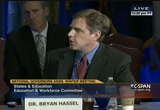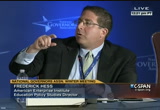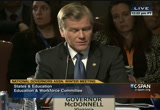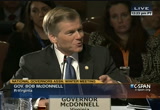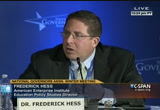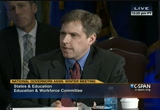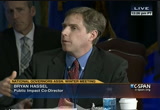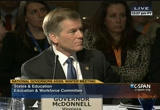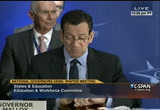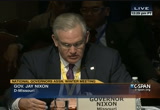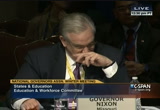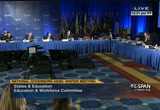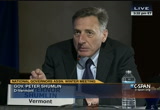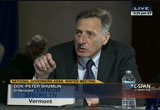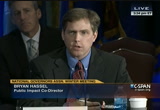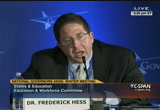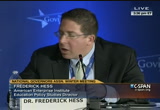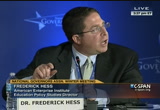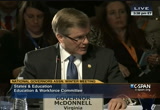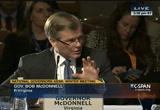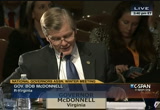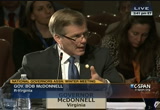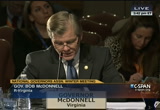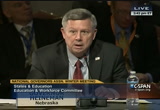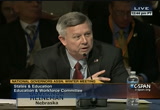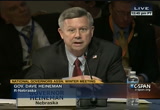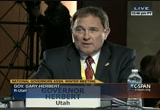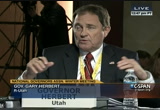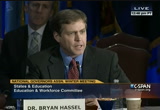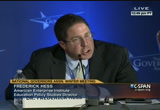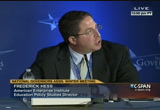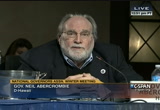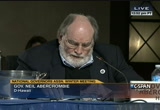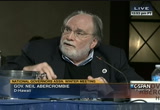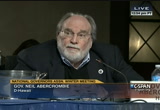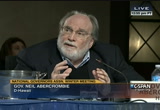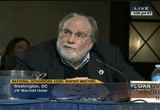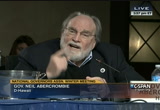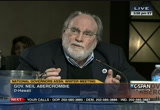tv Education and Workforce Committee CSPAN February 24, 2013 2:30pm-4:00pm EST
2:30 pm
in south dakota there is a guest suite named after president calvin could -- calvin coolidge. he wanted to get out of the hot air in dc in the summer. he stayed in custard park for three months and made it a summer white house. one of the suites is named for kaelin coolidge. i mentioned that because he said something once that i think was important. i have it taped on my desk in the capital. he said, "nothing in the world can take the place of persistence. genius will not, unrewarded genius is almost a proverb. education will not, the world is full of educated derelicts. persistence and determination alone are omnipotent."
2:31 pm
today we recognize people like my parents who surmount their disabilities and achieve success in a world of work. these are people who have worked harder than most. they had to. they are people with determination and courage and i am honored when i am among them. we also honor their employers who know that the most valuable workers is one that is loyal, dependable, and gives an honest day's's work for an honest a.'s pay. these people know that hiring people with disabilities is good business. adversity builds character and people with character are good employees. thanks for giving me your time and attention. i have enjoyed this panel. i enjoyed being with you last october. i think all of the employers here who open their minds and job sites to workers with disabilities. by helping them you are helping yourselves.
2:32 pm
your efforts also unlocked doors formally closed to workers with disabilities. thank you. [applause] >> thank you very much for that personal story. i think you can tell by the reaction how much everybody was touched by that. before we move on as want to ask you one short follow-up question. because of your own experience and what you have seen and lived, what is one thing you think a u.s. governor can do to
2:33 pm
make employing people with disabilities more possible, more realistic for employers in your state? >> i think practical steps are offered to talk about the leadership from the top, involve people with disabilities in announcements, identify employment-first as a policy or state is going to follow. by employment-first we mean that citizens with disabilities first and foremost -- the best service the government can give is held finding employment. to help parents understand that if they have a child with disability, they can inculcate in that child to the notion that i am expected to work when i become an adult instead of the notion of "i am disabled and i
2:34 pm
cannot work." it is all in one's head. for those with disabilities that want to work we should be racing to find them opportunities to work. it is mutually beneficial. >> that was some of the discussion from earlier today. now we are back live at the national gunnar's association winter meeting in washington d.c. for a discussion about education. afterwards we will be taking your calls.
2:36 pm
2:37 pm
i am honored to be joined by our committee's vice chair, gov. terry branstad of iowa. the proceedings of this meeting are open to the press and all meeting attendees. please make sure your cell phones are silenced. the briefing books for this meeting were sent to governors in advance and could be found in the blue binder in front of each of you. they include the agenda and background information, update on federal legislation activity under this committee's jurisdiction. to my right is the staff director of this committee. if you need any additional information or have any questions please see her. today we will hear from two distinguished panelists. after the formal remarks gunners will engage in a roundtable discussion on state reforms.
2:38 pm
before we begin, i would like to take a moment to pause in remembrance of the tragedy that struck sandy hook elementary school in the quiet town of newtown, connecticut. we lost 20 beautiful children and six groot educators who gave their lives in the service of their students. we in connecticut have come together. the town is slowly recovering and the students are back to school where they belong. we will never forget what happened and we must learn from the horrible event how to better protect our children and our citizens from violence. sadly, connecticut is not alone. violence of this nature have touched many in our state. barack, colorado, a college in virginia, a temple in wisconsin, a supermarket in tucson, arizona, a mall in
2:39 pm
portland, oregon. the list goes on and on. i ask all of you to join me in a moment of silence as we think of the countless lives that have been lost in our schools and around our nation in senseless acts of violence. i would like to invite you to make some comments. >> on behalf of all of your colleagues i want to begin by
2:40 pm
expressing my sincere condolences to you and all of the families impacted by the sandy hook tragedy. our children and grandchildren remain our most precious gifts. my family has been keeping you and all of the people affected by this tragedy in our thoughts and in our prayers. we are all interested in ensuring safe school environments for all of our kids. >> thank you the better. whatever our it the as to prevent these unthinkable tragedy is in the future, we fervently share the at least honest commitment to protect and care for the citizens. especially for our children. thank you. turning to our agenda i begin by saying that even in recent years, when state budgets have been stressed by the great recession, gunners have recognized that failure to responsibility and adequately
2:41 pm
invest in our children's education would be penny wise and pound foolish. educating our students and preparing them for the future work force is paramount to building a healthy society and a strong economy and a nation ready for a competition. in connecticut, education is one of our top priorities and we have enacted significant reforms and a significant new investments in both k-12 and higher education. we have increased our education aid to school districts. states in school districts need a strong federal partner as well. it has been over a decade since congress passed the no child left behind act. connecticut was fortunate last year to receive a waiver from the u.s. department of education for flexibility under the no
2:42 pm
child left behind at. these absolutions should not continue and they do not work for all of our states. it is time for congress to reauthorize the elementary and secondary education act. as gunners we stand ready to assist congress. -- as dubliners we stand ready to assist congress. -- as governors we stand ready to assist congress. this allows governors, chief officers, city and county leaders, local education board members, and state school board members speak with one voice and advocate for this authorization. we will not all agree on budget and priorities. we all do share a common goal of making sure our schools are safe and home to well qualified teachers and administrators,
2:43 pm
such that our children actually learn and reach their full potential. we are honored to have representatives from the coalition with us this afternoon. david atkins, executive director of the state governments, chris from the council state governments, from the national association of counties, from the national league of cities, from the national association of state boards of education, from the national city management association, and from the national school board association. i want to say to all of you thank you for the leadership and collaboration. dubliners cannot wait for washington d.c. to make progress on education legislation. in connecticut we certainly cannot wait. last year i joined with legislators and local partners.
2:44 pm
we authorized interventions in 30 of our lowest performing school districts, expand the availability of high-quality school models, taken actions to unleash innovation by removing red tape and other barriers to success, and ensuring our schools are home to the very best teachers and principals with their of valuation and support systems. our reforms and initiatives are particularly focused on the teaching profession as a list -- as a linchpin of success. recognizing their state and local leaders across the country are working to gather to support an incentivize innovations to grow school leaders and teachers. earlier this month i was proud to announce a historical aberration partnership with our state department of education and our two statewide teacher unions. we will create a competitive
2:45 pm
grant process to seek out innovation and best practices to attract top teachers and school leaders, and to retain them. teachers should be recognized for their hard work and should be supported in their efforts. as a nation we must work to strengthen and evaluate the teaching profession so that we can build upon our success as today and began recruiting the next generation of great teachers. the goal of this session is to highlight successful strategies and best practices to help grow, recruit, train, prepare, and support teachers and school leaders. at this point i would like to turn the floor over to the committee's vice chair for his opening remarks. >> thank you very much the better my life for your readership -- gov. malloy for your leadership. we live in a global economy and giving our students the skills to compete in that dynamic economy is vital to our state's
2:46 pm
future success. last year the legislature took a first step towards answering our call to provide transportation all education reform by passing legislation, teacher preparation programs that have exit exams and a major new curly child illiteracy and initiative. these actions are a good beginning but not early enough. i laid out three pieces that we can build upon and truly provide students with a world-class education they focus on having a great teacher in every classroom, a great principle leading every building, and high economic standards and strong matching a student assessment.
2:47 pm
the centerpiece of our reform is to update the teaching system by evaluating -- by elevating the teaching profession and that includes providing new teacher of leadership and compensation structures that provides five career path twice to provide more professional opportunities for teachers. similarly, principles, like teachers, need collaborative support to grow professionally. that is why we propose an executive coaching system that will help make sure that no prints paul works in isolation -- no principal works in isolation. our teach iowa initiative will address the problem of getting high achievers digging into teaching by raising beginning salaries and providing a $20,000 tuition reimbursement for high
2:48 pm
achievers to go into teaching, especially in key subjects like math and science. the third piece of our plan is a new college or career readiness certificate that high school students could earn in addition to their diploma. we would give students the option of taking college entrance exams or work force readiness test during their junior year in high school. let us get on with the discussion on how individual states can develop innovative human strategies to ensure that every child has an effective teacher and that we have great school leaders in every building. our panelists will discuss concrete state and federal action steps following their presentation. there should be adequate time for questions and answers. we have a lot to plenty of time for direct input from the
2:49 pm
governors who are present as well. they are telling us what they are doing in their space. the speaker's bios are available in your packet. i am going to give a brief introduction to our speakers -- to our speakers. he is a co-director of public impact in chapel hill, north carolina for he consults with government agencies, nonprofit organizations and foundations to dramatically improve k-12 education. he is a recognized expert on charges schools, school turnaround, education entrepreneurship and teacher and leader policy. his recent work includes co- authoring "seizing opportunity at the top." he earned his ph.d. in public policy at harvard university where he was a classmate of our
2:50 pm
other panelist, rick. rick is an educator, author, and political scientist who studies k-12 and higher education issues at the american enterprise institute for policy analysis here in washington d.c.. his books include, "common sense goal reform" and "spinning wheels." he also received his ph.d. from harvard university, worked as a former high school social studies teacher, thank you both for being here and for your opportunity to participate. i am going to turn the form over -- the floor over now. >> thank you for inviting us. we are very happy to speak to you today.
2:51 pm
thank you to my former classmate. we were in our doctoral programs at the same time. i am going to talk about teacher policy and then rick is going to talk about leader policy issues. i do not think i need to spend a lot of time talking about how important this is. teachers are the single most important school based factor that determines house -- that determine how well students learn. all of you have been working on this issue and have made great strides. i am not going to review the progress, which is impressive. what i want to talk about is my main point, even if all the policies we have been working on in the past few years were successful your states are still going to fall way short of the goal of having a great teacher for every child. to give every child that kind of access you need another wave of
2:52 pm
policy change that addresses some of the fundamentals that have not been addressed in this latest wave of policy. that is what i want to talk about today. one of the facts we need to confront is that even though spending on education has risen almost 150% in the last 40 years, a teacher pay on average has gone up about 11%. teacher work hours have gone up about 11%. affectively teacher pay has been stagnant. arguably we have been spending money on useful things but we haven't been investing it in things that make the most difference for student learning, attracting and or retaining greek people to the classroom teachers. -- attracting and retaining great people to the classrooms. most importantly, we raised the expectations for teachers. we said we don't want to just
2:53 pm
stand up and deliver instruction. we want to the stand and deliver results. not for some students but for all students. those results get more complicated with the common corps coming on line. teaching became less attractive as a profession, especially compared to other higher pay opportunity rich professions that compete with teaching. it is less so the go to a profession and other opportunities in the economy. only 23% of new teachers came from college classes. only 14 percent came from the top third of their college class. teaching became one -- became much less attractive to folks that really need to be teaching our students. i do not mean to beat too gloomy. but the result is on this slide. after all this time, only a fraction have teachers that are
2:54 pm
getting the results that we need for our students. a lot of class and have good teachers. for students who are behind and who need to close achievement caps, they need to make more than a year's worth of progress. only a fraction of teachers can deliver that under today's teaching force. the good news is we can fix this and governors can play a big role in fixing this. the reason you can is because of the developments that make it possible to get out of the one teacher-one classroom trap. the idea of having a great teacher in every single classroom is beyond what we can hope. if we get beyond the model we can get where we need to be. i'm talking about new technologies that allow students to spend sometimes learning digitally.
2:55 pm
freeing up the time of teachers then to be with more students into deeper work with them. we're talking about new school designs the talk about reorganizing the rolls within the schools so that great teachers can take responsibility for all student's learning, not just 25 that are in their classroom. governors can play a role in moving towards these new models, and therefore giving every child access to excellent teachers. at the same time, making teaching a super attractive and rear -- attractive career. here are some potential policy ideas that would help advance towards this. the first one is get selective about who can teach in your state's classrooms. said a clear bar and goal for raising the caliber of folks who entered teaching over the next five years in your state.
2:56 pm
eliminate policy barriers for excellent teachers reaching more students and leading their peers. whether that is limits on how much the best teachers can earn -- propose legislation to get rid of all of those policies. number three, start counting how many students in your state have excellent teachers in charge of their learning. you are already doing a better job of cutting how many teachers are excellent. start counting how many students have those excellent teachers. that'll get schools to think how they can get the most impact from them and how the most students benefit from their learning. declared new civil-rights to excellent teachers. tell students in your state they have a right to have an excellent teacher every year.
2:57 pm
finally. medical of pushing average teacher pay not just up to $5,000 or $10,000 but up to a six-figure career on average. set that goal and set to do it within the budget you have. do not say we are going to spend more. say we are going to find ways to reallocate that increase in education funding and invested in what matters most. if you do these five things, then this idea of a great teacher for every student suddenly becomes possible. i hope you have a chance to work on these policies in the next few years. with that i'm going to go to leaders. >> thank you. let me just echo how much we appreciate what summoning governors are doing on behalf of these kids. i am really picking some of these tough issues to tackle.
2:58 pm
ryan has just talked about the teacher half of the equation. there is obviously much more to say on that front. but if you think about what ryan just said in how we use talented teachers, what are schools are doing to make sure taunted educators are having as big an impact on as many kids as possible, we immediately get to the question of leadership. what are we doing to make the best use of limited talent and resources that we have? oftentimes we talk about improving school and system leadership we immediately start talking about the need to improve what we call in education instructional leadership. school leaders who are better mentors for teachers, who can improve curriculum and pedagogy. bill gates said the american high school was obsolete. he is right.
2:59 pm
55% of college-educated women became teachers years ago. now it is 15%. we continue with staffing models in how we use teachers, how we use technology, that are very much cemented in the norms of pre-world war two america. the challenge of leadership is not only be able to run schools better, but to reengineer schools so they make the best use of educators and resources or state provide. unfortunately, not because they are bad leaders but because we have often failed them, today's superintendents and principals are not equipped for that challenge. one way to think about this is what we talk about as instructional leadership. it is only half of what is required to be an effective leader. if you tried to turn round circuit city if you years back,
3:00 pm
it was not enough to simply no a lot about stereos or simply be a passionate champion of courteous stuarts and stewardesses. you had to figure out how to read engineer what your clientele needs as the world changes around them. unfortunately we do little or nothing to prepare leaders to do that. if you think about what you're states deeper in tenant and principals have when they're trying to serve children they only have foreign libyans. the construction of talent -- they have instructional talent. they have new technologies spanning from -- to online learning and digital materials. one of the reasons we hear about budget constraints is because we
3:01 pm
did such a poor job of maximizing the first three that the only way we can serve kids well as by taxing them. here is one real quick example. one of the things that talks about is when you observed some phenomenal case, you will see teachers who practice handing out this piece of paper to their kids. a teacher can pass out a dozen or 15 pieces of paper a day. in a lot of classrooms, at the time to start passing it out it is one minute to two minutes and took children are learning again. teachers have got that down to 15 seconds. the difference between a well coached soccer team and a poorly coached soccer team. that is an extra 15 hours a year. when they are showing up to ask you to find an extra two weeks of school, are they first making
3:02 pm
3:03 pm
cover personal management? only 5% actually deals with issues like compensation and termination. the rest this stuff that's very nice, but it is a light touch. professional development, culture building zero. they are not. that will turn around a low performing institution. that bubble does not just envelop them when they get trained but all through the careers. the two most widely read magazines, if you look at what they feature, they are written by colleagues and myself and they can get enormous insight into professional development and culture, but between 2009- 2012, if they were looking at a device for layoffs and agreements, it was nonexistent. these are things where we're putting them in the position to
3:04 pm
fail. we sit here and say they cannot do any. because they have rules and contracts that make it impossible to act. i am anything but an apologist. i have respected friends in the union's, but i give them a hard time myself. to be equally fair, if you look at the 50 largest collective bargaining agreements, look at the provisions around teacher compensation, work rules, assignments. you'll see one-third of them are really restrictive and only a handful are flexible but there is enormous flexibility and ambiguity. it's not entirely clear what they can do in a majority of provisions, but they will tell you all the things they cannot do because they have had little support to actually understand
3:05 pm
the difference between what is not usually done and what cannot be done. we're saying this happened in state after state as their fighting hard to create autonomy for school systems whether it is through charter schooling, chartered district, new teacher evaluation opportunities, new compensation. what you continue to hear is that they do not believe they can do things. if you look at the paper, it is clear that they are able to. it is clear they always have been able to. you say there's not a state role here. it is something for the local school boards to fix. i did this study with my colleagues at the national school board association and if you look for our nation's school board members tell you, you see their living in lake woebegone. they will say that their superintendents are below average. none believe they stink.
3:06 pm
hardly any believe they are below average. unless you believe your schools are already performing at that level, we need more than school board support. let me put five ideas on the table and then we will open it up. first, given the nation's leadership programs are staffed by perfectly nice people who think what they're doing is important, i do not meet the criticisms to impugn their integrity or intentions, but they are not in the opportunity to give your leaders the skills they need to take advantage of new opportunities around evaluations or what have you. it would be useful inappropriate start creating new programs to bring that expertise to bear. in nevada, they put $100,000 into a public education foundation and held leveraged that from philanthropic partners and they have built the yearlong program for a selected crew of
3:07 pm
leaders and those people are now getting the training they need to actually start thinking smarter about taking advantage of the opportunities. almost all of your states have relatively strict licensing requirements especially around school leaders. i am a fan of leaders being teachers, but i'm also a fan of the diverse thinking. but you're talking about schools and turnaround soon need a new kind of leadership, there's a real question about whether you really want to take out of the running someone who has turned around a local nonprofit, someone with deeper into the community, someone who can make organizations work simply because they have not been a licensed full-time equivalent teacher or because they have not gone to a school of education rahm. at rice university in texas, the business school has been
3:08 pm
accredited to train people to be principals and superintendents. we are creating an opportunity to not attack them but forcing them to prove their worth. third, clarify what's expected and allowed. this is where accountability has been enormously helpful in starting to make it clear what is expected of them and what is appropriate. it creates the wind at their back to make sure they know what they have to do but it is also the case that many have passed ambitious reform legislation that has not come to bear. in florida, there is a senate bill that had dramatic overhaul in teacher tenure. after all this enormous energy by a coalition, 97% of teachers in florida are still rated effective. nothing has changed because what
3:09 pm
has going -- what has been going on on the ground have not changed. how do we identify people doing more good for kids to make sure we honor and reward their efforts? it's hard to mandate managerial pay across the systems. personally, i think it's a mistake to try. as you start to find new dollars to put into the educational allocation, make some of those dollars contingent on local district, management and labor coming to the table was smarter, better ways to recognize and reward those doing more for kids. much of what we are talking about, taking and manager of new opportunities around technology, legislation, it requires more than just people in the cautions who can do it, but people who understand the state legal
3:10 pm
framework and of federal regulation, people who can leverage technology. most school systems do not have the first-rate talent they need when it comes to technology making sure that you are thinking about your state's higher ed system and the opportunities for a pipeline in this kind of talent is crucial. with that, i turn it over. >> thank you very much. thank you for your strong leadership and your vision reproving our public schools. you helped lead an excellent discussion. at this point, i'm going to open up for questions from the twornor's directed to these individuals or statements you might want to make. subsequently, i will call on governors who have previously indicated they would like to talk about some of the efforts in there around states and then
3:11 pm
finally, governors who have not been previously listed but wanted to participate in the process, that would be great as well. i just want to point now one of the things that i noticed about district administrators is that overwhelmingly, in almost state, the majority of the more educated at the state university as well. they get their masters and their doctorate from exactly the same faculty educating every other educator in the state. that's true in connecticut and it's true in quite a few states represented in the room. there is a lack of new, fresh ideas or approaches and i wonder what you think of that. >> i think it's exactly right. the mistake we have sometimes made in talking about reforms is to imagine that policy change will magically equipped people
3:12 pm
to tackle challenges or when they do not taken manage, we denounce them as bad or incompetent. we have often failed our leaders by not giving them died of thirst skills and that kind of support. partially it is institutional how much and eddie. -- homogenaity. they're not exactly getting acknowledge your honor. for instance, if you are in a school district and you figure out how to save $150,000 by making technology smarter or a way to staff for special needs students in a way that makes better use of the staff, there's nothing in our system in what gets recognized, nothing in what they brag about to actually honor and respect that work especially if it works in the
3:13 pm
next nine months. it is not only the pipeline they are coming through, but once they are in the field, we are steering them into very homogenized behaviours. >> understanding we will not change that system overnight, with respect to this pipeline of ideas coming out of the same universities for the majority of leadership in the state, do you have any suggestions on how else to change it? >> 3 easy ones to start, and the nevada institute, rather than trying to force leadership preparation and change, it's a way to diversify the environment. you start with a coalition of the willing. leaders who are eager but have not been given the opportunities. second is to look at programs in your state that already exist that are outside of the education schools who would like the opportunity to play.
3:14 pm
public administration, business schools, undergraduate colleges of business, for heaven's sake. rather than trying to force education schools to do it better, let's start by making sure others who have better, smarter ways can complement them. one thing that stuff is even when you have a terrific chancellor at a state university, even when you have a great deal of education, they are dealing with institutions that are, by design, insulated. they have a tenured faculty, deeply entrenched programs. even for people in universities who want to be helpful, it can be like pushing on a string. it is also a question of what you may be able to do under high red funding were you create pools of resources for programs that will step outside familiar routines and will partner with non-traditional providers whether it is new leaders or the
3:15 pm
superintendent's academy, or anyone else to adjust our to diversify and enriched with the leaders are already getting. >> did you have any questions? >> yes, i am intrigued to buy what you said about the lake woebegone effect. that's one of the big challenges i always see. i cover may state that has historically high achievers and we led the nation in student achievement. today, massachusetts does and we are 25th. i think a lot of input is -- we are right let -- right next to michigan, so that may be part of the lake woebegone effect. we do not nearly have the issue with poverty and kids are learning another language, all of those things, but maybe not
3:16 pm
as great as some of the other states to have passed this just fine. i'm trying to jolted them into reality by saying, we have to get serious about getting better and competing in a world economy. i would like any insights you might have on how to effectively get that across and do so in a way that is not negative. i love teachers, and i really give them credit for the opportunities i have had in my career. i have a daughter who's a teacher. and yet, as you try to do it, the educational establishment gets very offensive about the data showing that we're not where we want to be. >> when you were sitting in a state governor's office, it's limited what you can do to march in change the way things work. one of the great levers that you have is shining a light.
3:17 pm
at the state level, you can put out an agenda of what you are trying to accomplish, your goals. you can measure how they're doing against it. a teaching quality is important, you can measure it much more effectively and have that shared with the public. this does not have to be the lake woebegone of that, but it takes it out of the realm of public opinion. he's just saying, what do you think about your superintendent? when you can shine the light on what's happening in your schools, it becomes more of a matter of facts. >> with that, i would like it to open it up to a few more questions and then we will move to a hearing for some of the governors and their own efforts. gov. heinrich. >> the top two priorities in my state are education and jobs.
3:18 pm
this is an area where i get in a lot of trouble on any given day. i want to go to teacher pay. i find it interesting on licensing requirements. in my state, warren buffett would not qualified to teach finance. the teacher pay issue, which i think is important, we have gone to statewide testing and that's not the only thing we ought to be concerned about. and we get something back in terms of accountability, whether that is last 10 years or whenever. some expectation is that it is tied to kostroma performance over a three-year timeframe.
3:19 pm
80% of the school budget is already teacher salaries, so where is the reallocation coming from? >> i will take the first step. the way we think about this is the current system is steps and planes. seps up the longer you are there and lanes are additional education. steps should be as you show effectiveness and you sure you are a better teacher robert ram. let's change the lanes -- a better teacher over all. you are leading a pod of
3:20 pm
teachers and reaching more kids through technology because of the exploding possibilities. you move up because you're having a bigger impact over time. how do you do it without just tacking on additional dollars which is a lot of time what we do and then the grants go away on the money is gone. even within the compensation part of the budget, forget all the other things that might be a source of reallocation. in the compensation budget, how can your reallocate that in a way to enable higher pay for your best performers? think about it classroom level with five teachers, a few paraprofessionals and some support people, that's a pool of compensation. is that the best way to use the pool of money? what if you change the team so there is one excellent teacher and a few other teachers in the
3:21 pm
team, a smaller team overall, but one that is organized and led by a great teacher? take the savings achieved from that, pay the excellent teacher more for her leadership. a -- a key to getting results, however take on larger responsibilities. all that's not even reaching out beyond the compensation part of thisudget but it's change in a way that's better for kids. >> were uneasy way to think about this is one century ago, there is no such thing as a medical specialization. today, they recognize roughly 200 specialization. only about 10% of them are m.d .'s, the rest are rn's. it is only $15,000 for higher education compensation if you look across. doctors make a lot of money.
3:22 pm
what happens is other people who support and complement them earn a lot less. one way to think about this is as we have those educators making a huge difference for kids, how do we put them in a position where they have much more impact on their charges, their colleagues, and how do we then think about those other positions in school as complementary rather than assuming we need 50 people doing the job? >> thanks, governor molloy. a very good discussion. i appreciate the focus on teacher excellence. it is something we have adopted in virginia. it is something we are all grappling with. we send our secretary of education to finland, which has some of the best teachers in the world, and they record the top 10%, pay them like doctors and
3:23 pm
lawyers. there's something to that. i have two questions. we have created the center of excellence for teachers to take those five-year teachers and send them back to one of those schools. you talk about this entrepreneurship program at a price which sounds really intriguing, and i wonder if you could get to as a description about what you do with these career teachers. to governor malloy epoxy question, you're talking about what you really need to teach for these young people in the universities to make them world- class teachers. do you take an education major and teach them laugh? or do you take the math major and teach them how to teach? what's the best model for the best teacher? that is sort of one of the fundamental discussions about
3:24 pm
how we record the best people and from what programs we put them in. >> i will speak to the first half and then brian can take the second. there is a case study idea that the rice program which i would be happy to share. in virginia, you also have the university of virginia partnership which does similar work, particularly for people in turnaround's. business and education are working together to make sure there is a broader set of skills and training. these kinds of opportunities exist across the country. the price model is one. there are at least three really interesting models right now. one is teach plus, another is educators for excellence, and the third is leading indicators which is in new orleans. all are different iterations of a model that each of them try to
3:25 pm
take terrific teachers who otherwise to the same thing 180 days per year and try to find opportunities to leverage these people to cultivate them and make sure they are actually getting involved in policy conversation that the state level and make sure we are growing them so we do not get them for five years and then they run off. they can build a career in the k12 space. >> can you get us the best blueprint of what is out there? i would love to take a look at all of these. you get education majors or disciplinary experts? what's best? >> we need to be a lot more selective in who becomes teachers and go for the best candidates, but what does that mean? the danger is, let's put up a bunch of procedural hoops for
3:26 pm
people to go through to prove that they are ready to teach, education course work, instead, i think how you want to think about this is, what can we ask them to demonstrate when they're 22, 25, or when they're teaching that we think, based on research, it correlates to what will be successful in the classroom and is probably being strong in our content area and having a set of competencies' that go along with being an effective teacher. what do great teachers do? they set high goals, they figure out what each student needs. those are competencies' we can observe before they ever become teachers because they could have shown them in other walks of life. show me know your stuff and you have the competencies', then we can be a lot more selective without putting up hurdles for people becoming a teacher over time. >> we look at this in connecticut in particular.
3:27 pm
one thing you may want to ask of the institutions who are graduating and certifying teachers is how they track of them for their first five years of their career and what questions they ask of them. what you will probably find out is that there's a great difference between how many teachers from which university or college day for more than three years and what it's telling you is perhaps because they push real classroom teaching experience too late in the four-year, they're graduating people not because that they really wanted to be teachers but they were trapped by the education they received in the first three years they were there that they had to go out and find a job. the inability in this industry within these colleges and universities to actually do self analysis is stunningly absent. you just may want to go back and
3:28 pm
get your deans and presidents around a table to have that discussion. i just assumed that they could give me lots of data based arm ongoing contact and interviews with their graduates. they have almost non. it's an issue that we have to build those systems. in this four-year program, we need to get them in the classrooms really early so they can make a final decision not when they are trapped in other credits in an area where they change direction the cannot graduate on time. they need to figure this out much sooner. i want to apologize and i want to thank the two teachers -- speakers, but we have about half an hour ago. a series of governors have expressed an interest and the talking about their own efforts
3:29 pm
in their own states, so i want call on them. i will begin with the governor nixon, if you want to take the floor for a few minutes? >> i'll be quick but i do not think i can talk as quick as our prisoners. i appreciate the amount of informations coming in a short amount of time. thank you so much to the presenters who have given us much to think about. i will be quick. we focused on the coalition of the willing on the front then down trying to put a pilot study in place and getting people to volunteer. and we figured we would just prove it on the backside. if we get rid of 100 schools that we are now including into the usual things you need in measuring student growth, academic growth, linking teacher still leaders, and then using it as a part of the evaluation as
3:30 pm
this moves forward to be able to use it on the compensation greta as well. it's very controversial to get through am the only way was to get this cooperative measure. one of the challenges we had is there was a long talk about if you should use student tests to count, leadership skills, and rather than fire away through the legislature, we found a coalition of the willing to move forward and we should have, at least for the show me state, some ground-breaking data to be able to say these are the leaders, these are the indicators, and how well students do has a lot to do with health well they are succeeding also. >> thank you, governor. speaking to the efforts in vermont. >> this has been
3:31 pm
extraordinarily informative. one of the things that we have really been doing is looking very closely at the relationship between the lack of qualified employees we have for our employers and it's all about science, math, technology, systemic. we know that. we found a real discrepancy between our math and science skills doing pretty well and what we're getting in high school. we really dug into that and called it a comprehensive package that starts with insuring the biggest investment in early childhood education and then we're actually asking each student in elementary school to develop an individual plan that taylor's that student's educational enterprise to their interests and their skills. we do not lock it in, but we want to ensure we are doing a
3:32 pm
better job of connecting outcomes with profession, amount of money you make, what degrees you need to achieve those professions and making a really clear that the stem sciences are where the jobs are. we're really promoting one of our big challenges as a state, probably one of the most progressive funding programs where literally, community by community, regardless of what you choose to spend at the annual town meeting, everyone makes the same tax efforts to raise that money. as a result of a court order, we implemented a system where we equalize the effort. if you happen to be in a property-wealthy town, you do not have an advantage over the community next to you who may not be. we did that way back with governor dean. while we did great work on equalizing the effort in
3:33 pm
equalizing resources, we have not moved at the needle in terms of moving poor kids from property beyond high school. -- from poverty. if we are not moving them beyond, they're stuck in a low- wage job. it doesn't mean we need to get them a four-year degree or a ph.d., but training is critical to the jobs we are all talking about to go from $9 per hour to $30 an hour, manufacturing jobs and the rest. we're starting the biggest dual enrollment program that has been launched in our state where we are trying to get more college accredited high school teachers giving college credit in 11th and 12th grades so that the lower-income kids can get a feel for college before they even leave. that's exciting. work-force training is
3:34 pm
incredibly important. we see this is the comprehensive answer to job growth. the point you have just made will be incredibly helpful. we are a high spending state. we spend $15,500 on average. we have great schools, but we want them to beat the best. what that we turn to the panelists and give them each a short period of time to take up the stem issue and what your studies have shown. >> when thinking about teachers and stem, the challenges are heightened because the job opportunities for people who have training are even greater than they are for teachers on average. if you look at math and science teachers you are high and the effective, what are they able to go do after they leave teaching
3:35 pm
or before they are a teacher? we need to think about what they're seeing when they looked at the teaching job if we're going to attract and keep a bigger portion of those people. when we surveyed the top one- third college guard george including stem majors, they wanted a career were they would be working alongside all some peers, a career with opportunities to advance, where they could earn more more quickly, not having to wait until the end of their career. we need to step up and offer those kinds of opportunities especially with stem a. >> two particular thoughts. the harder it is to find a balance, i used to teach social studies. it is relatively easy for schools and districts to find people who can teach history and social studies because a lot
3:36 pm
more majors the dance with. when it comes to science and math, it's much more challenging to find talented educators. it should make it that much more important that we be very careful that we're squeezing all the juice out of the orange. even in a high performing school, i bet you dollars to donuts that if you ask them to show you the best high school math teacher in that school and a typical long terms of in a math class that they each teach by koses of mass -- five classes of math. the good of a hospital andros to see the best cardiovascular surgeon in the state, you would be disappointed if they are cleaning up the cafeteria. it's not a good use of time and talent. the notions laid out our critical there. three interesting models to look out.
3:37 pm
in a collaborative of teachers working together to start to rethink the role of an individual's medical -- educator. part adm in arizona and is a really intriguing way -- carpe diem in arizona. the third is a rocket ship academy in california. modern technology has gone to the point where me now have a terrific complement's the teachers. it is not where you are for technologies or teachers, you now have tools that allow them to do more good for kids. there is a great high-powered elementary school-targeted map program where it's engaging stuff and it gives them a lot of assessment and feedback. you do not do it instead of great math teachers, but if you could have them spending more of their learning and practicing on
3:38 pm
this, your great teachers can spend more time actually mentoring, coach and one-on-one. what are your schools doing making sure they get the full use out of the talent they already have? >> at our state universities that have engineering programs and education schools is to figure out how to get a joint degrees of every time an engineer leaves they could come into a classroom part-time, full-time, later in their career come all whatever. gov. bob mcdonnell come you wanted to say a few things about your efforts. >> like most of the other governors, we have embraced the idea of a great teacher with great resources and motivation as a key. we have had a number of reforms and i will this go down the list quickly. our focus this year was on
3:39 pm
resources, accountability, and choice. we started by reviewing and revising our teacher tenure laws and extending a provision from three years to 5 at the front end and redefining the nature of the tenure by allowing one poor performance review as a clear basis for teacher removal. we're trying to get rid of those at the bottom who are not performing and also revised the procedure to make it shorter and more fair. we put a lot more resources in. there was not much, but an extra 2% in this year, $80 million, but it did dollars million into a merit pay program. strategic pay to find new ways to incentivize local divisions to pay the best teachers and more. we will be starting that.
3:40 pm
we embrace the teach for america program. we have about 300 teach for america students, but none of them can teach in virginia. that is an innovative way of getting teachers in underperforming school districts, and i think it will be a great place. stem is critical at every level. we have no bonuses and performance incentives for teachers to come in. math majors, engineering majors, and getting them in the classrooms to teach. we had a few others that were somewhat controversial, grades, transparency a-f. they do not understand partially credited become a fully accredited in the jargon we use to grade schools. everyone knows what those mean and will encourage parents and the community leaders to do
3:41 pm
something about it. we are changing that evaluation center. related to that, we have created a policy that has zero tolerance for failing schools. if you fail for more than two years, you will essentially have a new district created to take over, now management, a charter school, something else. chronic failure is unacceptable. that was pretty dicey, as you can imagine, but that has now passed. we set a policy of having 65% of all education dollars go to the classroom. how do you pay for this? you take the money out of bureaucracy and put it into the program. we were at 61% and now we are at 64%. we had a red tape and bureaucracy reduction act with a
3:42 pm
new wavers for jurisdictions to be able to find their way out of certain mandates that were inflexible. we are also asking for that. we essentially put an end to social promotion in third grade by major new third grade reading incentive to stop promotion to fourth grade to cannot read at the great level. of which all see it in our schools. the contrary to the dropout rate in high school but they are not able to read. we put a lot of money into third grade remedial, but we have created a barrier. we have done some things in the choice area with tuition tax credits as an significant new monies for to have an effective choice between public and private schools with the tuition tax credit legislation. we created several paths to have alternative license, especially for those in the military.
3:43 pm
we think they make great teachers. if foreign buffett cannot teach, may be a general coming out of the military cannot either, so that's not right. we also got rid of some of the education, seven different types of degrees, and no one could figure out what they meant. we made it clear we were raising the bar and now everyone knows. deal ofing a great difference. that's what we're doing. >> thank you very much. gov. it heineman, did you want to talk about your efforts? >> governor malloy, thank you. one thing we're trying to do is take a leadership role, even the most of us do not control their departments of education, it makes a difference. i now chair the p16 effort. aunt the chairman of our
3:44 pm
legislations education committee is there. the past year, we did something very few states have ever done. we committed one hour and half in committed time that see what they were succeeding act, but there challenges were as we try to put a greater focus on academic achievement. it was a very worthwhile effort. you can imagine trying to coordinate the many calendars how difficult that was. we had just tried to put the emphasis on academic achievement, online learning, somewhere we have to do a better job than we had done previously. on the affordability of college education, my proposed a budget this year, we worked with the university of nebraska and our state colleges and we were willing to make the investment to have a two-year tuition freeze and that has been wildly popular among students and parents. it was only six or seven years ago that i was writing those
3:45 pm
checks so i remember it well. the big difference for us as we have tried to work in this effort with all of the leaders of education from teaching to administrators, parents. they are all part of the effort. i refuse to let the meetings turn into a discussion about money. it's going to be about academic achievement. i have really been pleased with the focus we have put their. we're trying to go out and recognize schools that have done well with academic achievement and highlight them. it's not about putting a negative attitude on those who are not succeeding, but let's find out where the best school district is relative to demand and then i want to share that wherever it may be. as governors, we can make a huge difference in terms of the leadership role even if we do not have control of our department of education because
3:46 pm
we are in a position to bring the spotlight onto education, transparency, and all that we need. >> gov. herbert, do you have comments? >> on the campaign trail, the first question asked is, what are you going to do for education? this is a topic in all of our states and we recognize the connection between having a good educated workforce with skills and the ability to have a sustainable, growing economy. i would just like to pose the question to our guests here about the role of competition. clearly, as we attract people into the teaching profession, we think in terms of salary, developing an adequate salary to attract them to come in and retain them wants to get them in the kostroun sit. the pathway to success seems to be through administration.
3:47 pm
sure that halfway is always right. maybe we should pay teachers the same amount we pay some of our principals and superintendents and keep them where they may be the best. at meriting to look pay in utah. we want to compensate people based on their skills. if you are skilled in math or science, we're going to pay you more because we have to compete with the marketplace, so you might find a better job. we'll also a introduced charter schools and to the system so that there is opportunities for the customer to do some shopping. we have introduced legislation to grade our schools. you can see to shop and compare. in the private sector, we see
3:48 pm
that competition brings excellence. i'm just wondering what your thoughts are on competition. it's a unique situation. it's not necessarily the same for the public education system. what are your thoughts on how we can introduce competition as a way to improve teaching and leadership in our school system? >> if one of you want to respond up to two minutes, then i will call on gov. abercrombie and then we have to move to other business items before us. have had it. >> the most important competition many to be thinking about his competition with other career opportunities that the most talented people have. that is where we need to focus our energy because we are not winning that race nearly the way we need to. if we can be more effective at providing higher pay
3:49 pm
opportunities and career advancement without leaving teaching but with expanding impact over time, as a teacher, we're in a much better position than we are. >> it's a great question. i am generally predisposed to think that a great way to get the best out of people is to reward them when they do well and to not reward them when they do poorly. competition is that principal at scale. the problem is you have to be thoughtful about what we are rewarding in the competition. post-soviet russia was some kind of a market economy and most of what it reward it was theft and they got an autocracy. we've got to be smart and thoughtful about what is being rewarded in the competition. i think your point is precisely right. if you go to a major law firm or health-care organizations, the most highly compensated are
3:50 pm
those actually doing the work. this is a place where state compensation schedules actually make it harder, even for the district who wanted to come to act on that principle. a final word of advice on all this, some of what we have talked about today may sound not a part of your responsibility. you're thinking in terms of statutory reform and legislation, execution, but there is a principal named walter jackson in houston who took over a turnaround school. these kids were reading at a second and third grade level. he needed people to actually knew how to teach second and third graders but these new english lit. even though the state of texas was enthusiastic about what they were doing, there are rules on the books concerning teachers of
3:51 pm
record in licensure prohibiting them from signing an elementary teachers. when he talks about looking for opportunities to make sure that your people at the state level are not accidently getting in the way of people wanting to serve kids, there is an enormous expanse of stuff like this that has built up over the decades that is well deserving of your interest. >> we have a few minutes, governors. "we are probably a bit of an anomaly throughout the 50 states because we have a single school system or the entire state. we are an island state, obviously. some the other non contiguous states, alaska, bomb, and others, can relate -- guam and others. i'm not quite sure how it works with everyone else, but we have
3:52 pm
to get through a planning board, an elected board. the appointed board, i got to make all the appointments. as long as i was getting blamed for everything, i thought i should have the opportunity to appoint the people to give them the good reason to blame me. and then i brought the superintendent, we have one single superintendent for the entire system as well. they come into the cabinet meetings. i have the support of the teachers' union when i ran because of this and this is a good lesson -- be careful what you wish for because they got me. there is now an imposed contract in hawaii because what we put in this board, they do not have to worry about politics about
3:53 pm
evaluation, recruitment, termination, consummate rigid compensation, classification policy. it is all built into the contract that we offer. i hope to put together a collective bargaining law in hawaii. we're in four decades and the politics and everything comes around to get you. we have an evaluation system that cultivates, i think, and nurtures highly effective teachers. we have a mentoring program where new teachers for debate in a mentoring program for hawaii induction standards. we are reallocating significant tidal two funds. it is a regional area of five or six and elementary schools, the middle and high schools in the region as a we have for the different islands. the standards established a common quality.
3:54 pm
we have introduced core curriculum in standards. we require first and second year teachers to do professional development and growth. we are piloting and education effectiveness system. we have about 250 schools. have a performance evaluation at about one-third of the public schools right now. 2500 teachers, dozens of administrators, complex areas, staff, all participating. all principals are transition to a new performance-based evaluation system based on outcomes and best practices for principles. all of this is underway right now and it's all being fought tooth and nail by the leadership of the teachers' union. i helped to form the first
3:55 pm
teachers union. i was a member of the executive board of the first union in university. i have been an executive board member of the afl-cio. i have been in and negotiated contracts myself. it's a very difficult proposition. the teachers are buying in. the students are buying in. my bottom line on that is, quickly, that the question here is whether you have institutional inertia of, particularly in a collective bargaining context that cannot get to some of the bigger issues of principle but have been enunciated here today. the parents want to do it, kids are responding. the problem is, at the present
3:56 pm
time, at least in my context, the statewide contract has not yet been able to be achieved. we achieved at the negotiating level, but we have not been able to get the board of the union to get it to the membership. if push comes to shove and we have to continue to impose the contract we will take it up but the point. with all the things i just mentioned and those that have been covered here today, i have a few quick points i would like us to consider. this is what i'm finding. we have not spent much time talking about class differentiation. what about compensation. i was a probation officer and i got paid the same whether i was dealing with traffic tickets or murder. it's the start getting into compensation differentiation,
3:57 pm
you get on a slippery slope very quickly. 87% of the kids were are free lunch at the school i visited last week because they are in an area of economic chaos and social dysfunction. the fifth grade class, up to the fifth grade, elementary school. by the time some of them are in fifth grade, they have had four uncles in their house, maybe more. you're smiling. you know what i'm talking about. those kids have a very difficult time. two-thirds a single parents, if they have parents, or they're being raised by their grandparents. i went to that school. every single child in the school through fifth grade had a laptop or a tabloid, which we have done.
3:58 pm
every single one of them. have been passed out since october. i have not lost a single one. they cling to them. that they can control. that they understand. they can work with those having trouble. go buy every classroom there and every kid is focused on learning. they are not looking around the room. every child is happy. we have had business and foundations giving us the money to do it. if there's going to be a national education, we talk about flexibility and getting things done, but if there's going to be a federal department of education, regardless of our ideological views, let them do something useful. make sure every single school child in elementary, two things happen. preschool and early childhood development and every single child in elementary school and
3:59 pm
middle school gets a laptop or a tabloid with the teachers who can handle it and it will make a huge difference. i believe it. it overcomes cost differences and a lot of things. thing, to principal overcome institutional inertia when it comes to negotiating contracts so that we do not have this where the children get lost in the discussion. the second thing is to have the technological capacity that exists now and not turn into a digital divide that will create a permanent bifurcation of the capacity for young children to be able to utilize all of their abilities and all the talents that they have. thank you. >> governor
71 Views
IN COLLECTIONS
CSPAN Television Archive
Television Archive  Television Archive News Search Service
Television Archive News Search Service 
Uploaded by TV Archive on

 Live Music Archive
Live Music Archive Librivox Free Audio
Librivox Free Audio Metropolitan Museum
Metropolitan Museum Cleveland Museum of Art
Cleveland Museum of Art Internet Arcade
Internet Arcade Console Living Room
Console Living Room Books to Borrow
Books to Borrow Open Library
Open Library TV News
TV News Understanding 9/11
Understanding 9/11